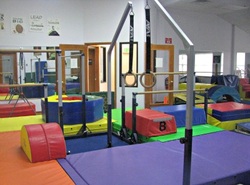
Growing up, holidays were my favorite. My mom went all out. As a result, I have massive Easter nostalgia: the bunny, the candy, the basket, wearing alarmingly dreadful dresses, making my church appearance for the year, and the awesome egg hung with my extended family. My cousins and I have children now, but we still celebrate all holidays with the same extended family. So when we're all present, there are 23 of us. And they are loud, talk a lot (myself included), and opinionated. In addition, we play loud games like catch phrase; even games like euchre get loud.
Now that I have Fischer, crowded and loud make for a rough day and a rough week of deregulation to follow. It's now Wednesday and we're still trying to get back to "normal". (FYI- I don't actually know what normal means.) He's chewing on blankets, sweatshirt ties, and toys. He's telling me 'no' when I ask him to do anything. And when he wants to mix it up, he says, "I'm not talking to you." He gets frustrated really easily and he gets rough with the tablet and his toys.
Getting clothes on the kid is manual labor. He's been wearing jammies for days because there is no way I'm even attempting to get him dressed. Well, pajama bottoms and a stained Justin Verlander shirt; changing the shirt is the most difficult part of dressing. He refuses to wear socks with his boots, and then they get sweaty and stuck on his feet and he gets pissed and screams. For whatever reason, even if I tell him not to wear cowboy boots without socks, it's still my fault when they won't come off. Funny how that works. Reverse psychology doesn't work and neither do threats and bribery, so I'm basically screwed. Yesterday, he refused to put shoes, socks, or a coat on when leaving my parent's house; I thought for sure he'd turn around and head back in the house when his arms and bare feet met 35 degrees, but no such luck.
Because his behavior is more "appropriate" and socially acceptable when i am not around, it might appear that I baby him or exaggerate his deregulated behavior. I think it's difficult for even those that we're close with to understand why he is "easy" when I'm not around. He's still effected by the crowds, noise, lighting, touch sensations and over-stimulation when I'm not around, he just utilizes his coping mechanisms. What a lot of people may not realize is that he works twice as hard as "normal" kids in over-stimulating situations, like holidays. Even when he's out-of-sync, if I am not nearby, he doesn't usually exhibit behavioral difficulties. But, as his OT says, I am his safety net. He doesn't have to be on-his-game when he's with me. He doesn't have to use the tiring coping mechanisms that he has developed for social situations. I'm glad I can be that for him, but damn, it is so tiring and frustrating.
Fischer is with his dad right now, which is why I have a necessary respite to compose this post. He will run him ragged and give him loads of heavy work to help regulate him, despite the entire 20 oz sprite that I know Kevin's buddy will give him. I only have 1 jar of olives left, and since I haven't had time to shower in days, I won't be able to make a public appearance to replenish. Ya know, 1 jar of olives only make 3-4 dirty martinis?
This Easter marks the second holiday that Fischer has made it public knowledge that he doesn't like one of my aunts.
Now that I have Fischer, crowded and loud make for a rough day and a rough week of deregulation to follow. It's now Wednesday and we're still trying to get back to "normal". (FYI- I don't actually know what normal means.) He's chewing on blankets, sweatshirt ties, and toys. He's telling me 'no' when I ask him to do anything. And when he wants to mix it up, he says, "I'm not talking to you." He gets frustrated really easily and he gets rough with the tablet and his toys.
Getting clothes on the kid is manual labor. He's been wearing jammies for days because there is no way I'm even attempting to get him dressed. Well, pajama bottoms and a stained Justin Verlander shirt; changing the shirt is the most difficult part of dressing. He refuses to wear socks with his boots, and then they get sweaty and stuck on his feet and he gets pissed and screams. For whatever reason, even if I tell him not to wear cowboy boots without socks, it's still my fault when they won't come off. Funny how that works. Reverse psychology doesn't work and neither do threats and bribery, so I'm basically screwed. Yesterday, he refused to put shoes, socks, or a coat on when leaving my parent's house; I thought for sure he'd turn around and head back in the house when his arms and bare feet met 35 degrees, but no such luck.
Because his behavior is more "appropriate" and socially acceptable when i am not around, it might appear that I baby him or exaggerate his deregulated behavior. I think it's difficult for even those that we're close with to understand why he is "easy" when I'm not around. He's still effected by the crowds, noise, lighting, touch sensations and over-stimulation when I'm not around, he just utilizes his coping mechanisms. What a lot of people may not realize is that he works twice as hard as "normal" kids in over-stimulating situations, like holidays. Even when he's out-of-sync, if I am not nearby, he doesn't usually exhibit behavioral difficulties. But, as his OT says, I am his safety net. He doesn't have to be on-his-game when he's with me. He doesn't have to use the tiring coping mechanisms that he has developed for social situations. I'm glad I can be that for him, but damn, it is so tiring and frustrating.
Fischer is with his dad right now, which is why I have a necessary respite to compose this post. He will run him ragged and give him loads of heavy work to help regulate him, despite the entire 20 oz sprite that I know Kevin's buddy will give him. I only have 1 jar of olives left, and since I haven't had time to shower in days, I won't be able to make a public appearance to replenish. Ya know, 1 jar of olives only make 3-4 dirty martinis?
This Easter marks the second holiday that Fischer has made it public knowledge that he doesn't like one of my aunts.

 RSS Feed
RSS Feed